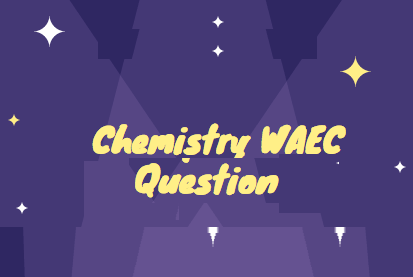60 Top Chemistry Questions for Serious 2023 WASSCE Candidates

The WASSCE for school candidates is around the corner and as part of your revision, attempt the following 60 Top Chemistry Questions for Serious 2023 WASSCE Candidates.
60 Top Chemistry Questions for Serious 2023 WASSCE Candidates – FIRST 30
- Explain the principles of the kinetic molecular theory of gases and how it explains gas behavior.
- Compare and contrast an endothermic and exothermic reaction, and provide examples of each.
- Discuss the concept of chemical equilibrium and how it is reached in a reversible reaction.
- Explain the difference between a weak acid and a strong acid, and provide examples of each.
- Discuss the different types of intermolecular forces and their effects on the physical properties of substances.
- Explain the relationship between entropy, enthalpy, and Gibbs free energy in a chemical reaction.
- Discuss the principles of acid-base chemistry, including the Bronsted-Lowry and Lewis theories.
- Compare and contrast the properties of ionic and covalent compounds, including their bonding and melting points.
- Explain the role of catalysts in chemical reactions, and provide examples of common catalysts.
- Discuss the factors that affect reaction rates, including temperature, concentration, and surface area.
- Explain the principles of thermodynamics, including the first and second laws, and their application in chemistry.
- Discuss the principles of chromatography and how it is used to separate mixtures of substances.
- Explain the principles of nuclear chemistry, including radioactivity and nuclear reactions.
- Discuss the properties and behavior of acids and bases in aqueous solutions.
- Explain the concept of chirality and how it affects the properties and behavior of molecules.
- Discuss the properties and behavior of metals and their alloys.
- Explain the principles of electrochemistry, including oxidation-reduction reactions and electrochemical cells.
- Discuss the principles of organic chemistry, including functional groups and stereochemistry.
- Explain the principles of spectroscopy and how it is used to identify compounds and determine their structures.
- Discuss the properties and behavior of polymers and their applications in industry and everyday life.
- Explain the principles of photochemistry and how it is used in chemical reactions and processes.
- Discuss the properties and behavior of gases, including gas laws and the ideal gas law.
- Explain the principles of surface chemistry and its applications in catalysis and materials science.
- Discuss the properties and behavior of liquid crystals and their applications in display technology.
- Explain the principles of coordination chemistry, including complex ions and ligands.
- Discuss the properties and behavior of supramolecular chemistry, including molecular self-assembly and host-guest chemistry.
- Explain the principles of biochemistry, including enzymes and metabolic pathways.
- Discuss the properties and behavior of nanomaterials and their applications in electronics, medicine, and materials science.
- Explain the principles of green chemistry and its applications in sustainable chemistry and industry.
- Discuss the properties and behavior of non-Newtonian fluids and their applications in industry and everyday life.
60 Top Chemistry Questions for Serious 2023 WASSCE Candidates -SECOND 30
- Discuss the properties of acids and bases, and provide examples of each.
- Explain the concept of chemical equilibrium and how it is reached in a reversible reaction.
- Discuss the different types of intermolecular forces and their effects on the physical properties of substances.
- Explain the principles of organic chemistry, including functional groups and stereochemistry.
- Discuss the properties and behavior of metals and their alloys.
- Explain the principles of thermodynamics, including the first and second laws, and their application in chemistry.
- Discuss the properties and behavior of gases, including gas laws and the ideal gas law.
- Explain the principles of electrochemistry, including oxidation-reduction reactions and electrochemical cells.
- Discuss the principles of acid-base chemistry, including the Bronsted-Lowry and Lewis theories.
- Explain the principles of nuclear chemistry, including radioactivity and nuclear reactions.
- Discuss the principles of chromatography and how it is used to separate mixtures of substances.
- Explain the principles of spectroscopy and how it is used to identify compounds and determine their structures.
- Discuss the properties and behavior of polymers and their applications in industry and everyday life.
- Explain the principles of photochemistry and how it is used in chemical reactions and processes.
- Discuss the properties and behavior of liquid crystals and their applications in display technology.
- Explain the principles of coordination chemistry, including complex ions and ligands.
- Discuss the properties and behavior of supramolecular chemistry, including molecular self-assembly and host-guest chemistry.
- Explain the principles of biochemistry, including enzymes and metabolic pathways.
- Discuss the properties and behavior of nanomaterials and their applications in electronics, medicine, and materials science.
- Explain the principles of green chemistry and its applications in sustainable chemistry and industry.
- Discuss the properties and behavior of non-Newtonian fluids and their applications in industry and everyday life.
- Explain the principles of surface chemistry and its applications in catalysis and materials science.
- Discuss the different types of chemical reactions, including synthesis, decomposition, and combustion reactions.
- Explain the concept of stoichiometry and how it is used to determine the amount of reactants and products in a chemical reaction.
- Discuss the principles of chemical kinetics, including reaction rates and mechanisms.
- Explain the principles of acid-base titration and how it is used to determine the concentration of an acid or base.
- Discuss the principles of redox titration and how it is used to determine the concentration of a substance.
- Explain the principles of atomic structure and the periodic table, including the properties of elements and their electronic configurations.
- Discuss the properties and behavior of solutions, including concentration, colligative properties, and osmosis.
- Explain the principles of gas chromatography and how it is used to separate and analyze volatile compounds.
READ: Difference Between “How Are You?” and “How Do You Do?”
Here are 10 tips for passing a chemistry final exam:
- Start studying early: Give yourself plenty of time to review all the material, especially if the exam covers multiple topics. Don’t wait until the last minute to start studying, as this can lead to feeling overwhelmed and stressed.
- Organize your notes: Make sure your notes are organized and easy to access. Use color-coding or other systems to help you quickly find the information you need.
- Practice problems: Chemistry is a subject that requires a lot of practice. Practice solving problems from previous exams and homework assignments to familiarize yourself with the types of questions that may be on the final exam.
- Focus on the important topics: Prioritize the most important topics, such as the ones that were emphasized in class or that you struggled with the most. Make sure you have a solid understanding of these topics before moving on to the others.
- Use flashcards: Flashcards are a great way to memorize formulas, equations, and other important information. Make your own or use pre-made ones available online.
- Study with a group: Study with classmates to share knowledge and understanding. You can help each other with difficult concepts and practice problems together.
- Use mnemonics: Use memory aids such as mnemonics to help you remember information. For example, “OIL RIG” can help you remember that oxidation is losing electrons and reduction is gaining electrons.
- Get enough sleep: Make sure to get enough sleep before the exam. Lack of sleep can impair your concentration and memory.
- Don’t panic: Stay calm and focused during the exam. If you don’t know the answer to a question, skip it and move on to the next one. Come back to it later if you have time.
- Read the instructions carefully: Read the exam instructions carefully and pay attention to any specific requirements or guidelines. Make sure you understand the format of the exam, the types of questions, and the time limits for each section.
Make good use of the 60 Top Chemistry Questions for Serious 2023 WASSCE Candidates and the tips provided for passing the Chemistry examination.
Send Stories | Social Media | Disclaimer
Send Stories and Articles for publication to [email protected]
We Are Active On Social Media
WhatsApp Channel: JOIN HERE
2024 BECE and WASSCE Channel - JOIN HERE
Facebook: JOIN HERE
Telegram: JOIN HERE
Twitter: FOLLOW US HERE
Instagram: FOLLOW US HERE
Disclaimer:
The information contained in this post on Ghana Education News is for general information purposes only. While we endeavour to keep the information up to date and correct, we make no representations or warranties of any kind, express or implied, about the completeness, accuracy, reliability, suitability or availability with respect to the website or the information, products, services, or related graphics contained on the post for any purpose.



 How to buy UG Admission Voucher with Momo/Shortcode
How to buy UG Admission Voucher with Momo/Shortcode  Top 5 Universities in the Netherlands for Masters Studies
Top 5 Universities in the Netherlands for Masters Studies  John Mahama Lists Plans for Education Sector When he is Voted for
John Mahama Lists Plans for Education Sector When he is Voted for  The Poll Tax Ordinance of 1852
The Poll Tax Ordinance of 1852  Asogli State rejects renaming Ho Technical University after Ephriam Amu
Asogli State rejects renaming Ho Technical University after Ephriam Amu